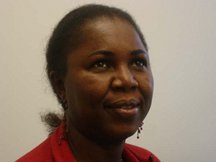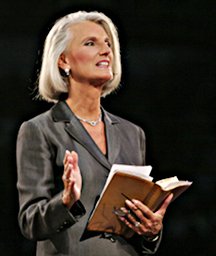How to fight Islamic injustice? Use Sharia as shield, Muslim lawyer says
CAMBRIDGE, Mass.—To many Americans, Sharia—or Islamic law—conjures up images of a vengeful legal system that punishes thievery with amputation and promises death by stoning for alleged adultery.
But as an attorney for those unfortunate enough to be sentenced to these punishments in the Sharia courts of northern Nigeria, Hauwa Ibrahim sees Sharia not as a sword, but a shield.
Ibrahim caught the world’s attention in 2002 as the human rights lawyer who rescued Amina Lawal, a poor and illiterate rural woman who bore a child out of wedlock, from a sentence of death by stoning. What’s less well known is that she did it using Sharia precepts.

Nigerian human rights lawyer Hauwa Ibrahim says Western critics of Sharia law often make it harder for her to defend those who face harsh sentences under the strict interpretation of Islamic law. (PHOTO/RNS/Omar Sacirbey)
|
ahim hopes lawyers tasked with defending clients in a Sharia system, as well as Westerners whose preconceptions about Sharia only antagonize the judges and public whom Ibrahim must convince, will use her writings.
Ibrahim, a 42-year-old observant Muslim, knows her clients well. In many ways, she was one of them, raised in a small rural village in Nigeria’s Muslim north, where patriarchy and poverty run rampant.
She also understands how overwhelmed and powerless they can feel. Ibrahim’s father was a mullah, and she was supposed to be married at age 12. But determined to stay in school, Ibrahim financed her own education by hawking roots and vegetables she picked on a nearby mountain.
As one of the few female lawyers in northern Nigeria, Ibrahim is admired by her colleagues but resented by the conservative religious establishment. Her most important work began in 2000 when 12 of Nigeria’s 19 provinces instituted Sharia law. Since then, she has defended more then 100 Sharia cases.
Inside the male-dominated Sharia courts, Ibrahim and her team often face a hostile environment, including accusations that she is trying to undermine Islam.
“The common accusation against us is that we are anti-Islam, anti-Sharia, and anti our culture and values,” said Ibrahim. “We are not anti-Islam. If anything, we are just trying to insure that there is justice, and that there is fairness in the administration of that justice.”
While Ibrahim appreciates the international outcry that such cases arouse—Oprah Winfrey’s advocacy on Lawal’s behalf generated 1.2 million e-mails sent to the Nigerian embassy in Washington—she also worries that some Western supporters may politicize the Sharia issue.
In Lawal’s case, rather than confronting the mullahs who were criticizing her, Ibrahim sought them out, wearing a headscarf, and asked their advice on how she could win her client’s freedom. While the mullahs did not take her side, her show of respect persuaded them to at least stay on the sidelines.
“She knows there are social forces in her community that she has to take into account, and she was willing to try anything to get the right result,” said Asifa Qureshi, a professor at the University of Wisconsin Law School who specializes in Islamic law.
In 2003, some 16 months after the case began, a Sharia appeals court overturned Lawal’s conviction. The court ruled that—contrary to Sharia law—Lawal’s confession was improperly obtained, that not enough judges were present at the original trial, and that she was not caught in the act of sex out of wedlock.
Ibrahim is exploring new strategies that she says give greater emphasis to the Quran and less to the Hadith, the collected sayings of the Prophet Muhammad. For example, while some Hadith may vaguely suggest stoning for adultery, the Quran clearly proscribes flogging.
“If the Quran is clear about whether you flog an adulterer, don’t complicate the matter,” she said. “Don’t introduce a Hadith to interpret what that section of the Quran says.”


 In 1993, Durso said, 51 women were serving as pastors of Baptist churches in the South. Now 115 women have been identified as pastors or co-pastors of churches affiliated with the Alliance of Baptists, Baptist General Association of Virginia, Baptist General Convention of Texas or Cooperative Baptist Fellowship.
In 1993, Durso said, 51 women were serving as pastors of Baptist churches in the South. Now 115 women have been identified as pastors or co-pastors of churches affiliated with the Alliance of Baptists, Baptist General Association of Virginia, Baptist General Convention of Texas or Cooperative Baptist Fellowship.